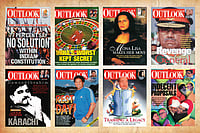No mere bastard child of the classical Panchatantra, no poor man's James Finn Garner, this. Punchtantra is the ultimate after-dinner mint. Chew gently on this After Eight: take your time, savour it, roll it in your head, double over in gentle mirth as its bittersweet funniness envelops you. In ringing acidspeak Bhatia sends up every conceivable contemporary stereotype: the lesbian, the libber, the working wife, the gender bender, the minority member, the majority major, the material muni, the obfuscating art critic, the "grassroots" organisation, the NGO, the "concerned" bystander. Every prized social lollypop gets a licking: subsidised foodstuff, "plump juicy car, beige in colour from the country's oldest automobile factory", mademoiselle bras, desi ghee, foreign liquor, flowered polyester sheets, aluminium chairs with rexine backs, automatic soda mixers, Kelvinator self-defrosting fridges, electric haircurlers, laptop computers.... At once aspirational dream object and emblem of the please-could-I-have-some-more middle classes.
Bhatia's characters lend themselves to his lampooning. There's the Defloured Brah-min who learns that life can "flour" even without the dough, daydreams about "buying airconditioned house with east-facing puja room in a decent, belief-specific neigh-bourhood"; of marrying a "beautiful young child bride" whose father would "offer" her to him because of his monetarily enhanced status; of setting up a charitable trust and using the tax-free interest for shopping sprees at Harrods in London. There's the Materialistic Ascetic, "sucker for utopian ideals" with the moneybag under his armpits, who sets up a Macintosh "in the rear side of his sanctum sanctorum just so he can catch the religious vibes on the Internet" even as he hides high interest bonds in Ganesha's trunk, the pile of Unit Trust certificates in goddess Laxmi's hollowed stomach.
Reversed stereotypes too do not escape his attention: the Heineken swigging, Gender Equation reading, horn-rimmed wife who finds her counterpoise in the duster-wielding, chappati-cooking, Chablis-chilling house husband. Then of course, there's the Rapunzel from Lesbos Land: star and central protagonist of The Long Haired Activist, the fairytale with a terrific twist.
He has a sharp eye and antenna ears, this sutradhar of our suburban sorrows. No bunkum goes unexamined, no blathering balderdash escapes his withering attention. That includes psychobabble jargon-fuelled drivelspeak about "self-determinism", the "purpose of art", "dualism", "moral existentialism", Jung, Freud. Even Woody Allen! In The Lion and the Art Critic, Bhatia mercilessly crucifies the hot air balloons, omnipresent at literary salons, seminars, soirees whose droning drives hapless audiences to suicidal despair. Not unlike the jackal who unable to bear the endless ra-ra of the artists camping at his cave entrance runs out to escape them. Straight into the jaws of a hungry lion. Moral of the story, this one mine: Even Death is Preferable to Drivel.
Or the communalism Bhatia satirises with such deadly precision in The Born Again Goat fable. Fire-worshipping, baggy-khaki-short-wearing Mitra Sharma, Brahmin of course, frets and frets about the dilution of India's truly secular culture together with the similarly sartorially inclined individuals whom he meets in a park everyday to raise hands with in strange Germanic salute and shout slogans of religious unity. Alarming situation, he proclaims to anyone who will listen, "the total population of India is 940 million. Of which only 730 million are Hindus. We Hindus constitute less than 80 per cent of the majority. Do you know there are more than 300 Jews in Kochi alone?" Fable or parable of our troubled times?
Not that Bhatia never adopts a gentler tone. Savage satire is often discarded in favour of compassion, warmth as in The Crows and the Psychoanalyst where the infertile crow couple decide to adopt when they cannot reproduce themselves. Moral of the story: if your plans don't hatch, adopt somebody else's.
Don't just laugh with this book. Treasure it. Read a story every other day. Maybe a relevant one for that particular day, for there's one for everything that you might experience or read about in the course of your depleting day: the dowry death, the gallivanting godmen, the racist on rampage, the female foetus killer, the bride burner. You'll still be outraged and unsettled when you read newspaper reports about 100-year-old oaks being converted into television trolleys, of organ traders, of child molesters, of scurrilous charlatans and politicians. But then pick up this book. It will help you cope. Maybe even make you smile at the foibles and fallibility of the human race. Sometimes, if only for a brief, furtive moment, even spot yourself as a character in this book that is of course about mythic other people, other lives. That he puts you in doubt about that last bit is Bhatia's singular and most salutary achievement.


























